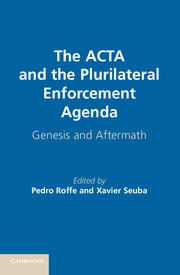Book contents
- Frontmatter
- Contents
- List of Contributors
- Foreword
- Acknowledgments
- Acronyms
- Introduction
- PART I THE FINAL ACT: ITS MAIN FEATURES AND CONTENTS
- PART II DOMESTIC LEGISLATIVE CHALLENGES
- PART III IMPACT ON RELATED PROCESSES
- 13 Three Steps Taken toward a Reinterpreted Three-Step Test
- 14 ACTA and the Future of Access to Knowledge in the Digital Environment
- 15 ACTA, East African Enforcement Legislation and Generic Medicines
- 16 The EU and Its IP Policies
- PART IV VIEWS FROM STAKEHOLDERS: LESSONS
- PART V WHAT LIES AHEAD ACTA
- Annex I Anti-Counterfeiting Trade Agreement
- References
- Index
13 - Three Steps Taken toward a Reinterpreted Three-Step Test
The Impact of ACTA and SOPA on TPP
Published online by Cambridge University Press: 05 December 2014
- Frontmatter
- Contents
- List of Contributors
- Foreword
- Acknowledgments
- Acronyms
- Introduction
- PART I THE FINAL ACT: ITS MAIN FEATURES AND CONTENTS
- PART II DOMESTIC LEGISLATIVE CHALLENGES
- PART III IMPACT ON RELATED PROCESSES
- 13 Three Steps Taken toward a Reinterpreted Three-Step Test
- 14 ACTA and the Future of Access to Knowledge in the Digital Environment
- 15 ACTA, East African Enforcement Legislation and Generic Medicines
- 16 The EU and Its IP Policies
- PART IV VIEWS FROM STAKEHOLDERS: LESSONS
- PART V WHAT LIES AHEAD ACTA
- Annex I Anti-Counterfeiting Trade Agreement
- References
- Index
Summary
Introduction
The public opposition to the Anti-Counterfeiting Trade Agreement (ACTA) and the Stop Online Piracy Act (SOPA) has already had a positive impact on the proposed Transpacific Partnership (TPP) Agreement. The text concerning copyright limitations and exceptions, leaked in August 2012, reflects two basic approaches – one proposed by the United States, the other proposed by New Zealand, Chile, Malaysia, Vietnam and Brunei. In general, both approaches represent improvement over the copyright exception language in existing US free trade agreements (FTAs). Accordingly, there is reason to hope that the final TPP Agreement will include strong language on copyright exceptions that will lead to balanced copyright regimes in the TPP region.
Because of the lack of transparency of the TPP negotiations, it is difficult to reconstruct a precise timeline of when specific language was proposed, who proposed it, and why. However, a combination of leaked drafts and public statements provides evidence of the positive impact that the collapse of SOPA in the United States and of ACTA in the EU may have had on the TPP provision addressing copyright exceptions and limitations.
Step 1. The US IP Chapter Proposal
In February 2011, the US proposal for the IP chapter of the TPP was leaked. At Article 4.8, it contained the following bracketed language: “Placeholders for provision on (1) exceptions and limitations, (2) Internet retransmission, and (3) any other appropriate copyright/related rights provision.”
- Type
- Chapter
- Information
- The ACTA and the Plurilateral Enforcement AgendaGenesis and Aftermath, pp. 225 - 235Publisher: Cambridge University PressPrint publication year: 2014



